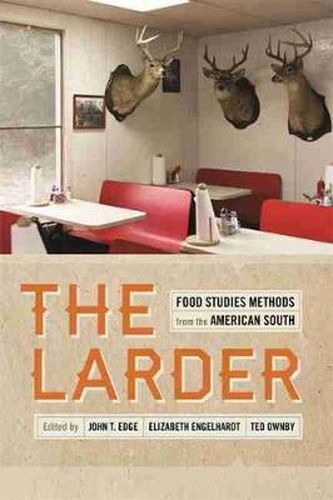Readings Newsletter
Become a Readings Member to make your shopping experience even easier.
Sign in or sign up for free!
You’re not far away from qualifying for FREE standard shipping within Australia
You’ve qualified for FREE standard shipping within Australia
The cart is loading…






The sixteen essays in The Larder argue that the study of food does not simply help us understand more about what we eat and the foodways we embrace. The methods and strategies herein help scholars use food and foodways as lenses to examine human experience. The resulting conversations provoke a deeper understanding of our overlapping, historically situated, and evolving cultures and societies.
The Larder presents some of the most influential scholars in the discipline today, from established authorities such as Psyche Williams-Forson to emerging thinkers such as Rien T. Fertel, writing on subjects as varied as hunting, farming, and marketing, as well as examining restaurants, iconic dishes, and cookbooks.
Editors John T. Edge, Elizabeth Engelhardt, and Ted Ownby bring together essays that demonstrate that food studies scholarship, as practiced in the American South, sets methodological standards for the discipline. The essayists ask questions about gender, race, and ethnicity as they explore issues of identity and authenticity. And they offer new ways to think about material culture, technology, and the business of food.
The Larder is not driven by nostalgia. Reading such a collection of essays may not encourage food metaphors. It’s not a feast, not a gumbo, certainly not a home-cooked meal , Ted Ownby argues in his closing essay. Instead, it’s a healthy step in the right direction, taken by the leading scholars in the field.
$9.00 standard shipping within Australia
FREE standard shipping within Australia for orders over $100.00
Express & International shipping calculated at checkout
The sixteen essays in The Larder argue that the study of food does not simply help us understand more about what we eat and the foodways we embrace. The methods and strategies herein help scholars use food and foodways as lenses to examine human experience. The resulting conversations provoke a deeper understanding of our overlapping, historically situated, and evolving cultures and societies.
The Larder presents some of the most influential scholars in the discipline today, from established authorities such as Psyche Williams-Forson to emerging thinkers such as Rien T. Fertel, writing on subjects as varied as hunting, farming, and marketing, as well as examining restaurants, iconic dishes, and cookbooks.
Editors John T. Edge, Elizabeth Engelhardt, and Ted Ownby bring together essays that demonstrate that food studies scholarship, as practiced in the American South, sets methodological standards for the discipline. The essayists ask questions about gender, race, and ethnicity as they explore issues of identity and authenticity. And they offer new ways to think about material culture, technology, and the business of food.
The Larder is not driven by nostalgia. Reading such a collection of essays may not encourage food metaphors. It’s not a feast, not a gumbo, certainly not a home-cooked meal , Ted Ownby argues in his closing essay. Instead, it’s a healthy step in the right direction, taken by the leading scholars in the field.